
Discover the differences between working as an agency healthcare assistant compared to full time Healthcare assistants. Find job roles, compare rates, & find out about the benefits and more to make sure you make the right decision for your career!
Healthcare assistants (HCA) are an integral part of the healthcare industry. They provide vital support to healthcare professionals and care providers in various settings, including NHS & private hospitals, care homes, and private healthcare providers. This blog post will explore the job requirements, advantages, and disadvantages of agency staff and compare agency pay rates to staff pay rates. Additionally, we will also provide information on how to get paid as an agency healthcare assistant and where to find agency Healthcare assistant jobs across the UK.
Agency Healthcare Assistants Jobs – 2023
Search Job below, for example ”Healthcare assistant Manchester”:
What is an agency Healthcare Assistant?
Agency health care assistants, including support workers provide temporary staffing solutions to various healthcare institutions such as nhs hospitals, private hospitals and care homes. These workers are not employed formally by the institution they work in, but rather they are employed by specialist agencies that supply healthcare professionals.
Job Requirements & Duties for Agency Healthcare Assistants:
The job requirements & duties for healthcare assistants are generally the same, whether they work on a temporary and permanent basis. To work as an HCA in the United Kingdom, you need to have a relevant level of experience in the care industry, have a caring attitude, good communication skills, and the ability to multitask. However, agency staff have to be more adaptable as they may work in different areas, which may require them to deal with a broad range of conditions and have experience working in several different settings.
Job Requirements:
To work as an agency healthcare assistant, there are certain qualifications and attributes that are typically expected. These may include:
Relevant Training
Completion of healthcare assistants training program or equivalent qualification is essential. This ensures you have the necessary knowledge and skills to provide quality care.
Right to Work
As with any healthcare role, you must have the legal right to work in the UK, along with any required documentation.
DBS Check
A Disclosure and Barring Service (DBS) check is usually required to ensure the safety and suitability of individuals working with vulnerable populations.
Experience
While prior experience is not always mandatory, having some experience in a healthcare setting, whether through voluntary work or previous employment, can be beneficial.
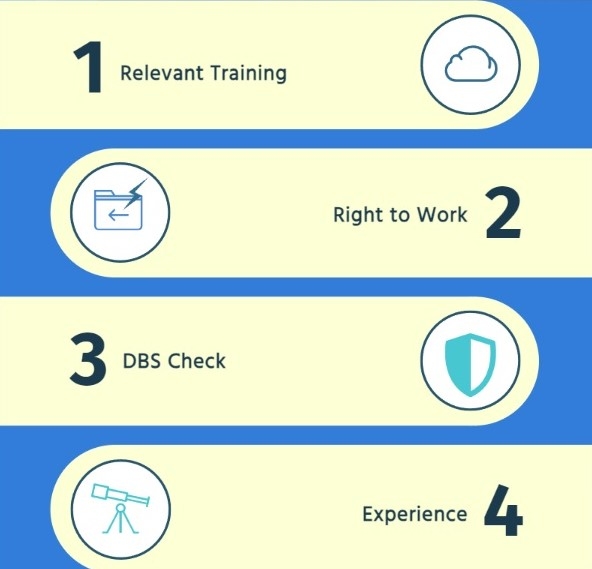
Duties and Responsibilities:
Agency healthcare assistants will be responsible for various tasks and duties, which may include:
Personal Care
Assisting with personal hygiene, toileting, dressing, and feeding, ensuring the comfort and dignity of patients.
Vital Signs Monitoring
Regularly checking and recording vital signs such as blood pressure, pulse rate, temperature, and respiratory rate.
Assisting with Mobility
Helping patients with mobility issues, including transfers, walking, and using mobility aids.
Medication Assistance
Supporting patients with medication administration, ensuring adherence to prescribed dosages and schedules.
Emotional Support
Providing emotional support and reassurance to patients, promoting their well-being and comfort.
Record-Keeping
Maintaining accurate and up-to-date documentation of patient observations, care provided, and any changes in their condition.
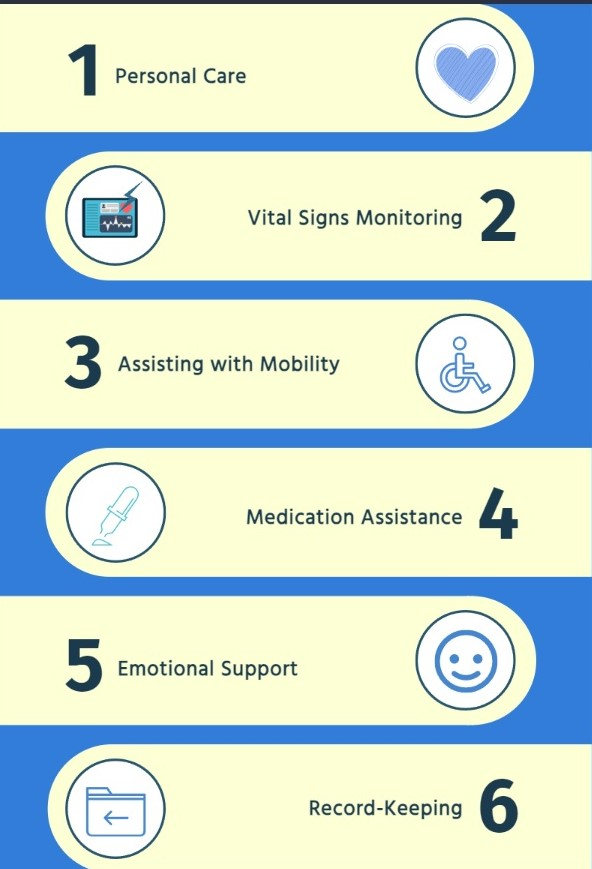
Working as an agency healthcare assistant offers a rewarding and flexible career path within the healthcare sector. By meeting the job requirements and fulfilling the duties and responsibilities, you can make a positive impact on the lives of patients while enjoying the flexibility and variety that agency work offers. In the next sections of this blog, we’ll explore the benefits and challenges of being an agency healthcare assistant, providing you with a comprehensive understanding of this role.
Remember, each agency may have specific requirements and expectations, so it’s important to research and communicate with potential employers to ensure you meet their criteria.
Advantages of Agency Work:
Working as an agency healthcare assistant offers numerous advantages, including flexible scheduling, exposure to diverse work settings, professional development opportunities, competitive pay, and the flexibility to choose shifts. These benefits make agency work an attractive option for healthcare assistants seeking greater control over their schedule, varied experiences, and continuous growth within their careers.
Flexible Schedule
One of the primary advantages of working as an agency healthcare assistant is the flexibility it offers. Agency work allows you to have more control over your schedule, enabling you to choose when and where you want to work. This flexibility is particularly beneficial for individuals who require a work-life balance, have other commitments, or prefer to work on a part-time basis. You can select shifts that align with your availability and personal needs.
Variety of Work Settings
Agency healthcare assistants have the opportunity to work in a variety of healthcare settings, including NHS & private hospitals, clinics, private healthcare providers, and community settings. This exposure to different environments and patient populations allows you to gain diverse experiences and broaden your skill set. It can also be an excellent way to explore different specialties within healthcare and discover which areas align with your interests and career goals.
Professional Development
Working as an agency healthcare assistant offers ample opportunities for professional development. You’ll have the chance to work alongside different healthcare professionals, learning from their expertise and expanding your knowledge and skills. Additionally, the exposure to various care settings and patient needs enhances your adaptability, critical thinking, and problem-solving abilities. This continual growth and learning contribute to your professional development and can lead to further career opportunities within healthcare.
Competitive Pay
Agency work offers competitive pay rates, which can be advantageous for an experienced healthcare assistant. In some cases, agency workers have higher earning potential compared to those in permanent positions. Additionally, agencies may provide additional benefits such as holiday pay, pension schemes, and ongoing training opportunities, enhancing the overall compensation package.
Flexibility to Choose Shifts
Agency healthcare assistants have the freedom to select the shifts that suit your preferences. Whether you prefer day, night, or weekend shifts, you can choose the working patterns that best align with your lifestyle and commitments. This flexibility allows you to achieve a better work-life balance and maintain a schedule that works for you.
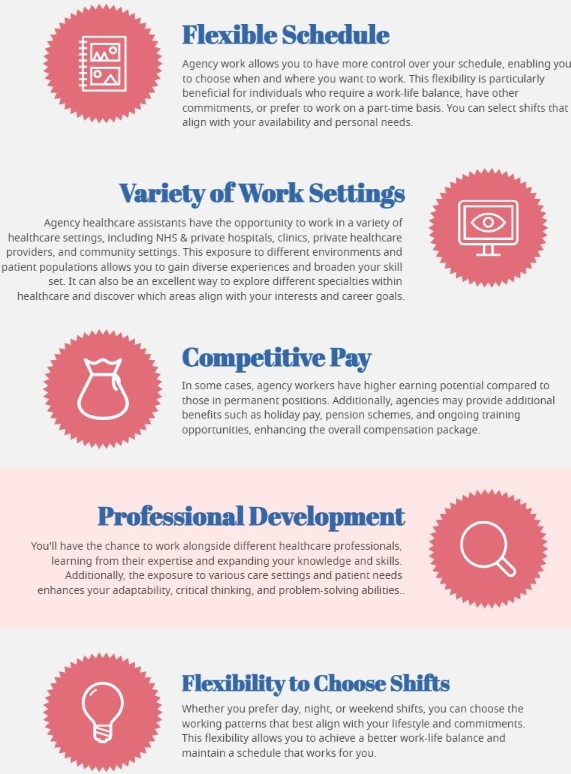
Disadvantages of Agency Work:
Agency healthcare assistants throughout the UK offers many advantages, it is essential to consider the potential disadvantages associated with this type of employment. In this section, we will explore some of the key challenges that healthcare assistants may encounter when working agency shifts. Understanding these factors will help you make an informed decision about whether agency work is the right fit for you.
Inconsistent Work
One of the main drawbacks of agency work is the potential for inconsistent or irregular shifts. The availability of shifts may fluctuate, and there can be periods of high demand followed by quieter periods. This unpredictability may make it challenging to maintain a consistent income and can impact financial stability.
Lack of Job Security
Agency healthcare assistant are not guaranteed ongoing employment or job security. You may need to continuously seek and secure assignments or shifts. This lack of stability can lead to feelings of uncertainty and may require you to be proactive in seeking new opportunities regularly.
Limited Employee Benefits
Compared to permanent positions, agency healthcare assistants may have limited access to employee benefits such as sick pay, annual leave entitlement, or pension schemes. It is crucial to carefully consider the overall compensation package and evaluate whether the benefits offered by the agency align with your personal needs and long-term goals.
Adapting to New Environments
Working as an agency health care assistant means you will frequently be working in different healthcare settings. While this can offer valuable experiences, it also requires you to adapt quickly to unfamiliar environments, policies, procedures, and teams. Adjusting to new settings may require a higher level of flexibility, adaptability, and the ability to quickly establish rapport with new colleagues.
Limited Continuity of Care
Agency healthcare assistants often work on a temporary basis, which means they may not have the opportunity to develop long-term relationships with patients or experience the fulfilment of seeing patients progress over time. Building continuity of care can be a challenge in agency work, as you may work with different patients and care teams during each assignment.
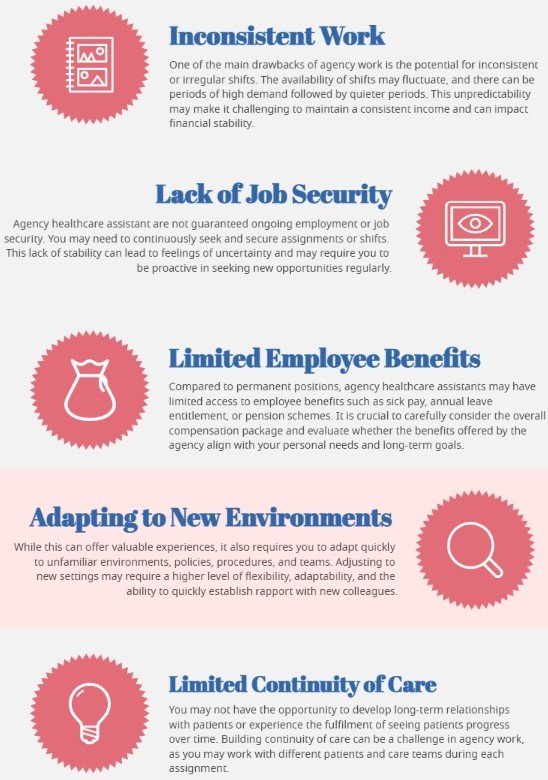
Agency Pay rates vs Staff Pay Rates:
The average salary for agency healthcare assistants throughout the UK can vary significantly depending on factors such as experience, specialty, and location. Agency healthcare assistants typically earn an hourly or daily rate rather than a fixed annual salary.
If you were working as an agency HCA on full time hours you could expect to earn a total gross annual income of around £28,000.
On the other hand, the average salary for a full time HCA in the UK depends on experience, speciality and location. According to the latest available data, you can expect to receive an average annual salary of £21,000 per year.
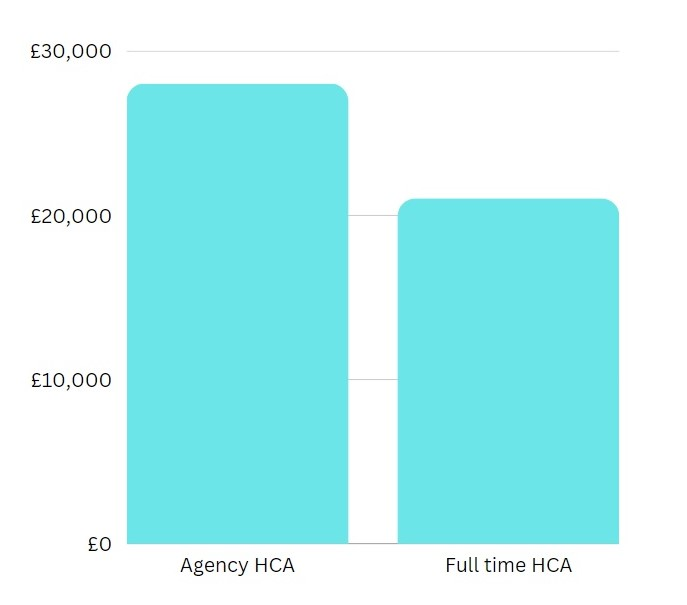
How to get paid as an agency healthcare assistant.
Payment Options:
1. PAYE: Many agency healthcare assistants are paid on a weekly basis. This means that you will receive your wages at the end of each week for the hours worked during that period. It is important to keep track of your hours accurately and submit timesheets promptly to ensure timely payment.
The most common method of payment for agency HCAs is through PAYE. You will need to provide your bank account details to the agency, who will then transfer your wages directly into your account deducting the relevant tax and nation insurance contributions. Make sure to provide accurate banking information to avoid any delays in receiving your payment.
2. Umbrella Companies: Some agencies may use payroll companies to handle their payment processes. In such cases, the agency will process your timesheets and payment details through the payroll company, who will then distribute your wages.
The umbrella company will make the relevant deductions, it’s important to ask the company the relevant benefits in comparison to PAYE and the processes to getting paid.
Submitting Accurate Timesheets:
To ensure accurate payment, it is crucial to submit timesheets that reflect the hours you have worked. Keep a record of your shifts, start and end times, breaks, and any additional work-related expenses. Double-check your timesheets for accuracy before submitting them to the agency, as any errors or discrepancies may result in delayed payment or incorrect wages.
Communicating with the Agency:
Maintaining open communication with your agency is important to address any payment-related concerns promptly. If you have not received your payment within the expected timeframe, contact your agency to inquire about the status. They can provide information on any potential delays, resolve any issues, or provide guidance on the payment process.
Keeping Track of Payments:
It is advisable to keep a record of your payments and monitor your earnings as an agency healthcare assistant. This can help you maintain financial stability and identify any discrepancies or missing payments. Consider maintaining a payment log or using budgeting tools to track your income and expenses effectively.
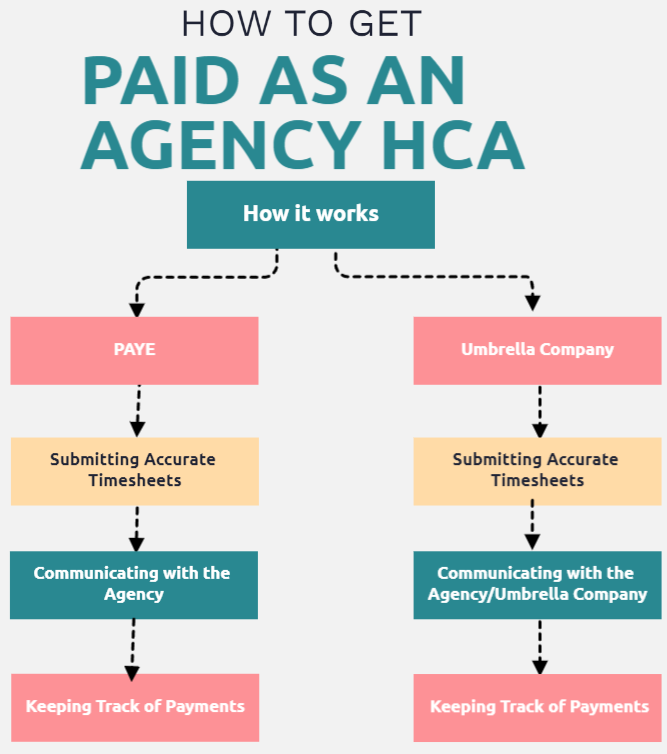
Where to Find Agency Healthcare assistant Jobs:
In conclusion, while both full-time and agency health care workers have the same job requirements and responsibilities, they vary in their working arrangements, rates of pay, and experience. There are pros and cons to working for a recruitment agency as an HCA, as we have highlighted in this blog post. The most important thing is that potential HCA’s consider all the factors before making their professional decision. Finally, we hope that this blog post has provided valuable insight into the healthcare industry and agency healthcare assistant roles & recruitment services.
If you’re ready to take your medical career to the next level? Whether it be in the NHS, private hospitals or a care home, look no further than our support workers & agency healthcare assistant jobs board, featuring hundreds of exciting healthcare assistant jobs & staffing solutions just waiting for someone like you. Don’t miss this opportunity to land your dream job and make a difference in the healthcare industry. Start browsing now!

